Key takeaways
- Embracing vulnerability fosters trust and deeper connections in coaching and community work, positioning uncertainty as a strength rather than a weakness.
- Brené Brown emphasizes that vulnerability leads to courage, creativity, and genuine relationships, encouraging honesty over perfectionism.
- Authenticity in leadership invites connection and transforms fear into trust, allowing leaders to bond with others through shared experiences.
- Personal growth through vulnerability requires continual practice and courage, creating spaces for mutual support and understanding.
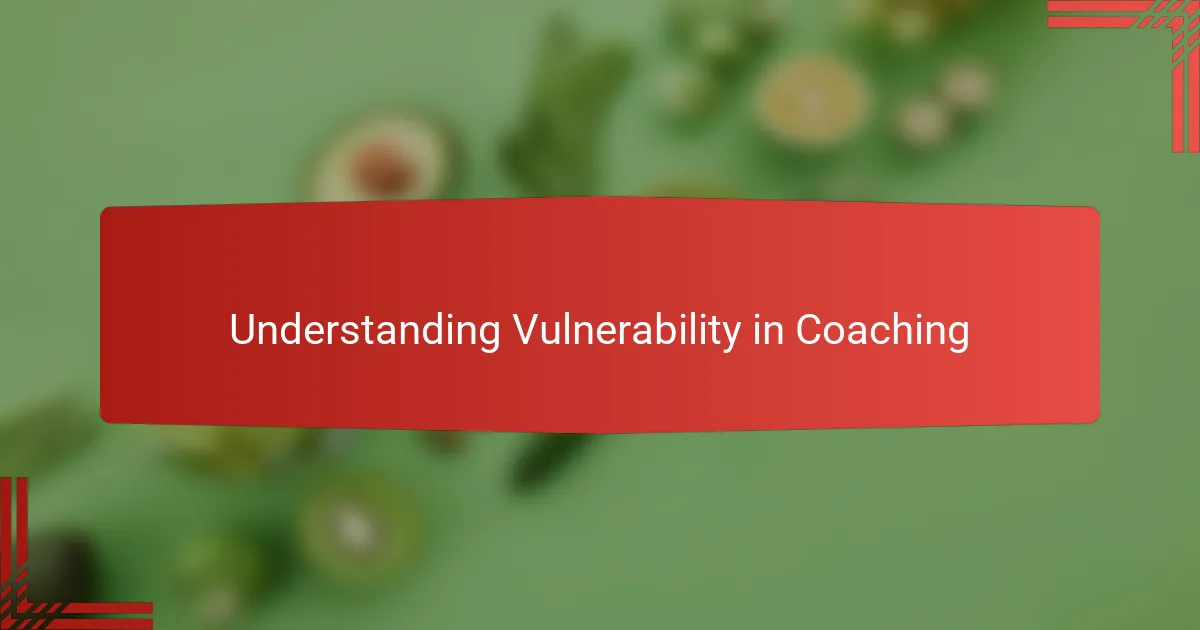
Understanding Vulnerability in Coaching
Vulnerability in coaching often feels like standing on the edge of a cliff, unsure whether to jump or retreat. From my experience, it’s about showing up as your authentic self, even when it feels uncomfortable. Have you ever hesitated to share your true feelings because you feared judgement? That hesitation is precisely what vulnerability asks us to face.
When I first embraced vulnerability in my coaching practice, I noticed a shift—not just in my clients, but in myself. It wasn’t about having all the answers; it was about creating a space where uncertainty could be welcomed rather than feared. This openness fosters trust and encourages deeper connection, which are essential for meaningful growth.
Understanding vulnerability means recognizing it as a strength, not a weakness. I used to think admitting struggles would undermine my authority as a coach, but Brené Brown’s insights reshaped that belief. Now, I see vulnerability as the bridge that connects human experience with genuine transformation, both for me and the communities I serve.
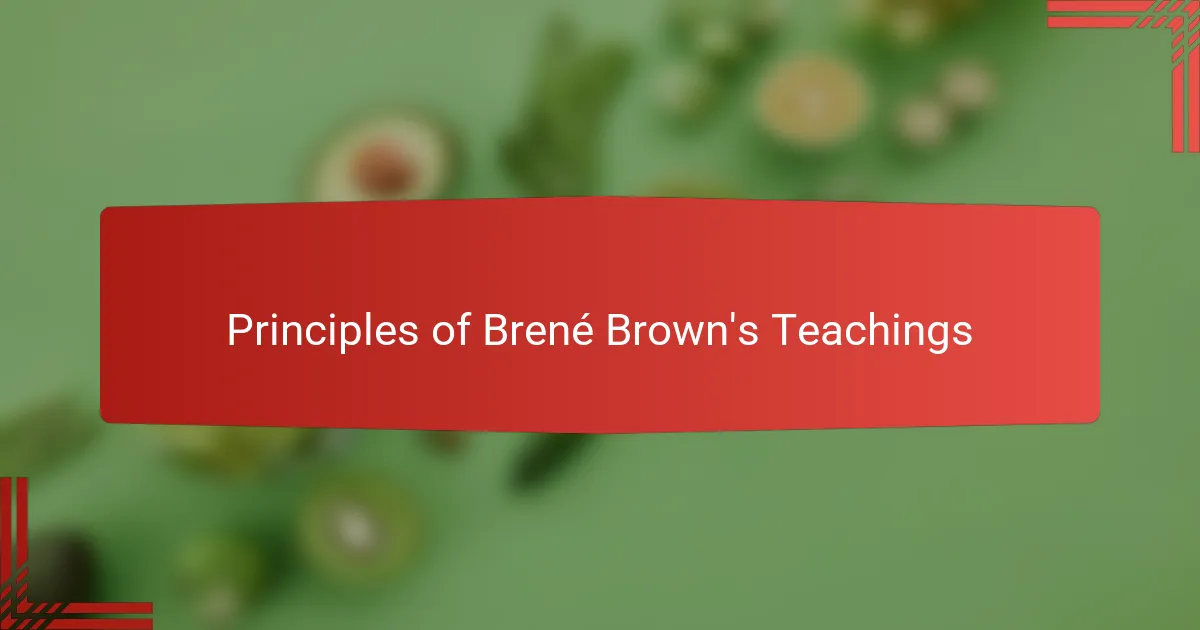
Principles of Brené Brown’s Teachings
Brené Brown’s teachings revolve around the principle that vulnerability is the birthplace of courage, creativity, and connection. I remember the first time this idea truly hit me—I was afraid to admit I didn’t have all the answers, but embracing that uncertainty opened a new door in my coaching. Isn’t it freeing to realize that being vulnerable doesn’t mean being weak, but rather showing up fully human?
Another core principle I’ve learned is the importance of wholeheartedness—living and coaching with a sense of worthiness and self-compassion. Brown’s work challenged me to let go of perfectionism, which felt like a heavy burden for so long. How often do we hold ourselves back because we think we must be flawless? Letting go of that expectation has changed the way I engage with my community and myself.
Finally, Brown emphasizes the value of empathy as a key to deep connection. I’ve found that it’s incredible how simply listening with empathy, rather than trying to fix, creates space for real healing. When you ask, “What is this really like for you?” and truly listen, the walls of distrust start to crumble. That moment of genuine connection is, without doubt, the most profound gift vulnerability brings.
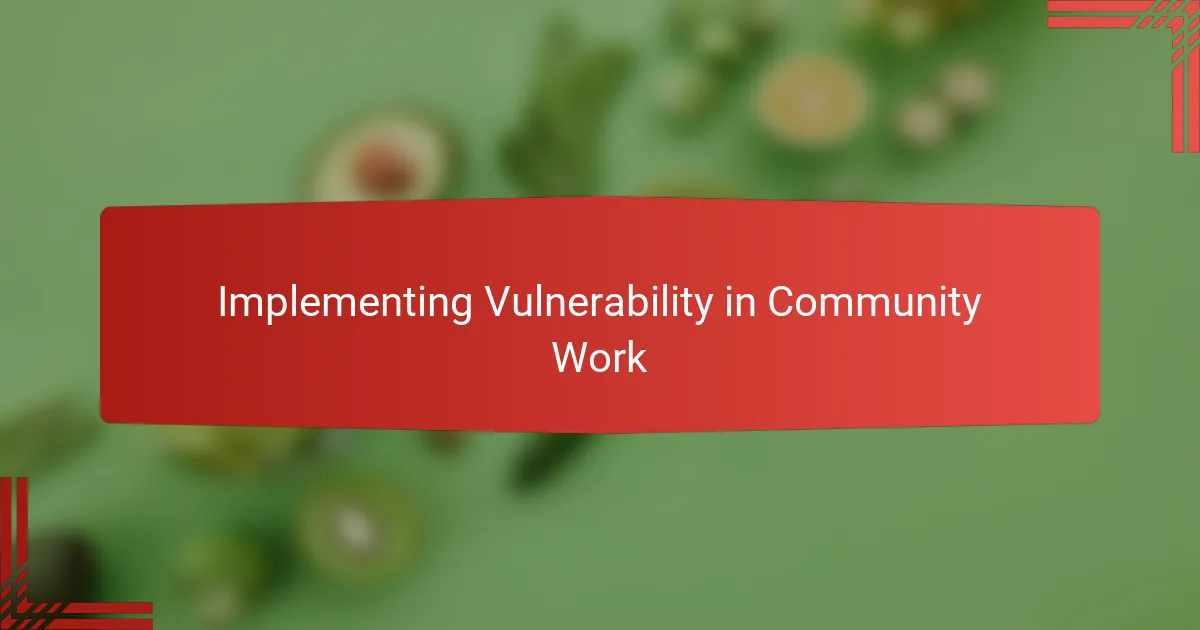
Implementing Vulnerability in Community Work
Implementing vulnerability in community work means being willing to share not just our strengths but also our uncertainties. I remember a moment during a community meeting when I admitted I didn’t have all the solutions—initially nerve-wracking, but it created a ripple of openness that allowed others to share their fears too. Have you noticed how this kind of honesty can dissolve walls and invite collaboration?
In practice, vulnerability invites us to step into discomfort without fleeing. I once hesitated to address a sensitive issue, fearing it might disrupt harmony, but by acknowledging my concerns openly, we sparked a more authentic conversation that ultimately strengthened the group’s trust. Isn’t it amazing how showing our true feelings can cultivate real connection rather than conflict?
Most importantly, embracing vulnerability requires patience—with ourselves and others—as we navigate complex emotions together. I’ve learned that when I model empathy and self-compassion openly, it encourages the community to do the same, creating a cycle of mutual support. How often do we underestimate the power of this shared courage to transform our community spaces?
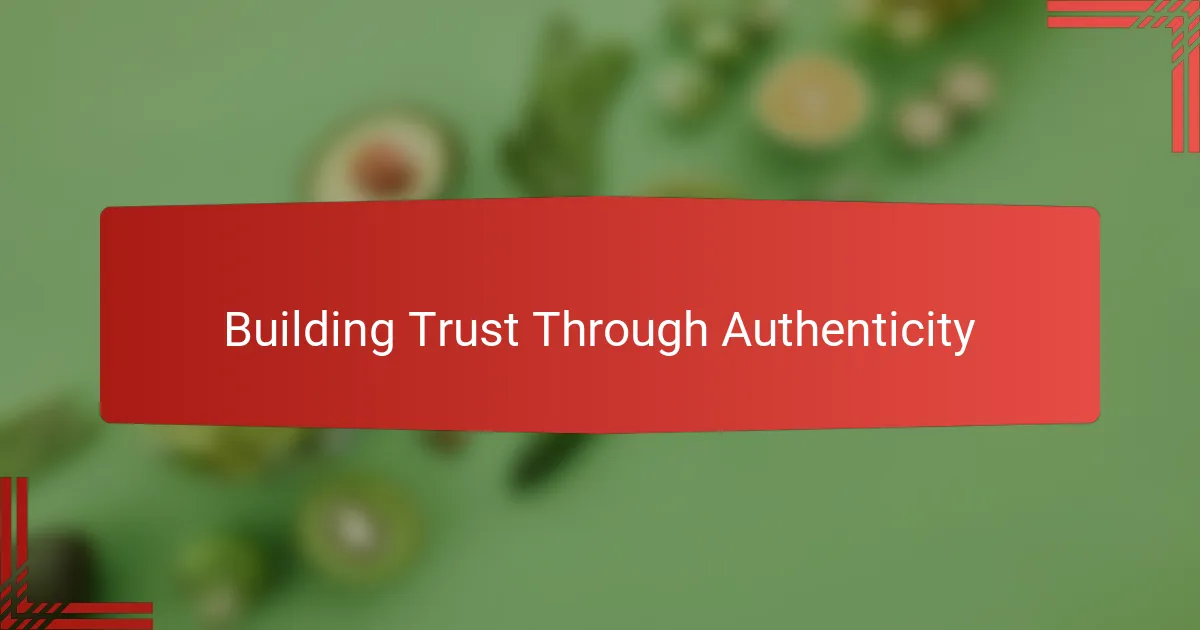
Building Trust Through Authenticity
Trust doesn’t just appear overnight; it grows from consistently showing up as our genuine selves. When I started sharing my own struggles openly, I was surprised to see how it encouraged others to lower their guards, creating a space where trust could truly take root. Have you ever felt that comforting shift when someone’s honesty makes you feel safe to be yourself?
Authenticity means letting go of masks and embracing imperfections. Early in my coaching journey, I worried that revealing my vulnerabilities would make me seem less capable, but I learned that real leadership comes from honesty—not perfection. That vulnerability became the glue that bonded me with my community in ways I hadn’t imagined possible.
Building trust this way requires courage, but the payoff is undeniable. When I openly admit what I don’t know or where I struggle, I’m not showing weakness—I’m inviting connection. Isn’t it remarkable how authenticity breaks down barriers and turns strangers into allies?
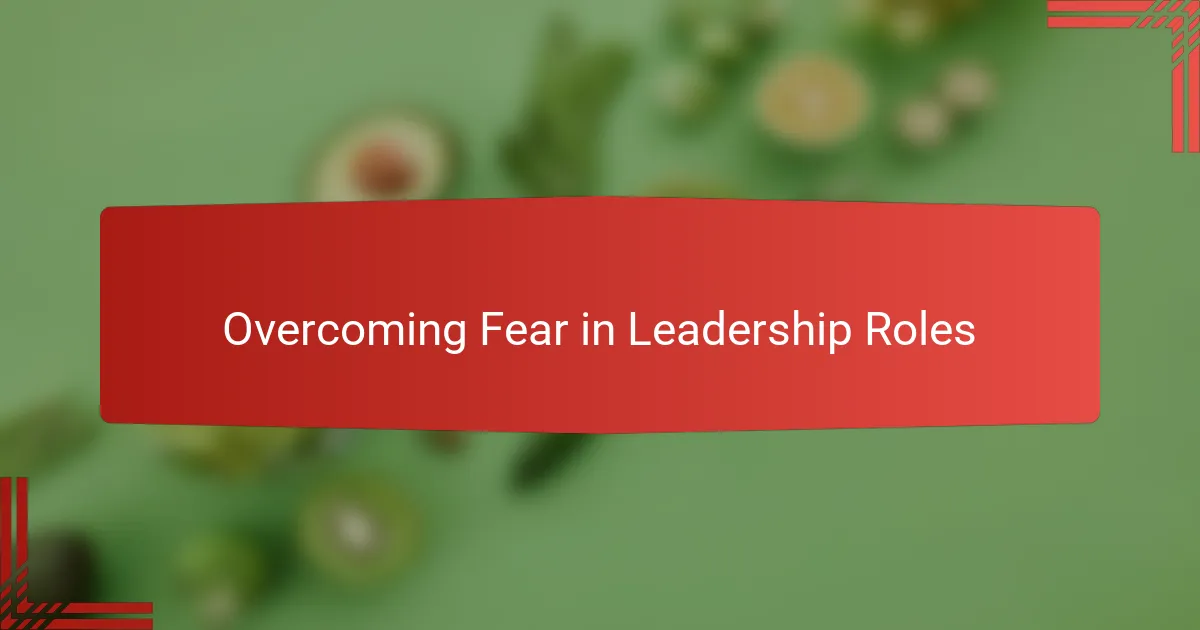
Overcoming Fear in Leadership Roles
Fear in leadership often feels like a shadow that follows every decision, whispering doubts and what-ifs. I’ve faced moments where that fear almost stopped me from speaking up or taking bold action. Yet, I learned that leaning into vulnerability means facing that fear head-on, not hiding from it.
Sometimes, I catch myself wondering—what if I fail or lose respect? It’s a natural question, but through Brené Brown’s teachings, I realized that acknowledging these fears openly actually humanizes leaders and builds stronger bonds with those we lead. Have you noticed how admitting uncertainty can turn tension into trust?
The most powerful lesson for me was seeing fear as a signal—not a stop sign. Rather than letting fear dictate my leadership, I now use it as a guide to be more honest and courageous. When I step forward despite fear, it invites others to do the same, creating a culture where vulnerability and strength co-exist. Doesn’t that shift feel like the foundation of true leadership?
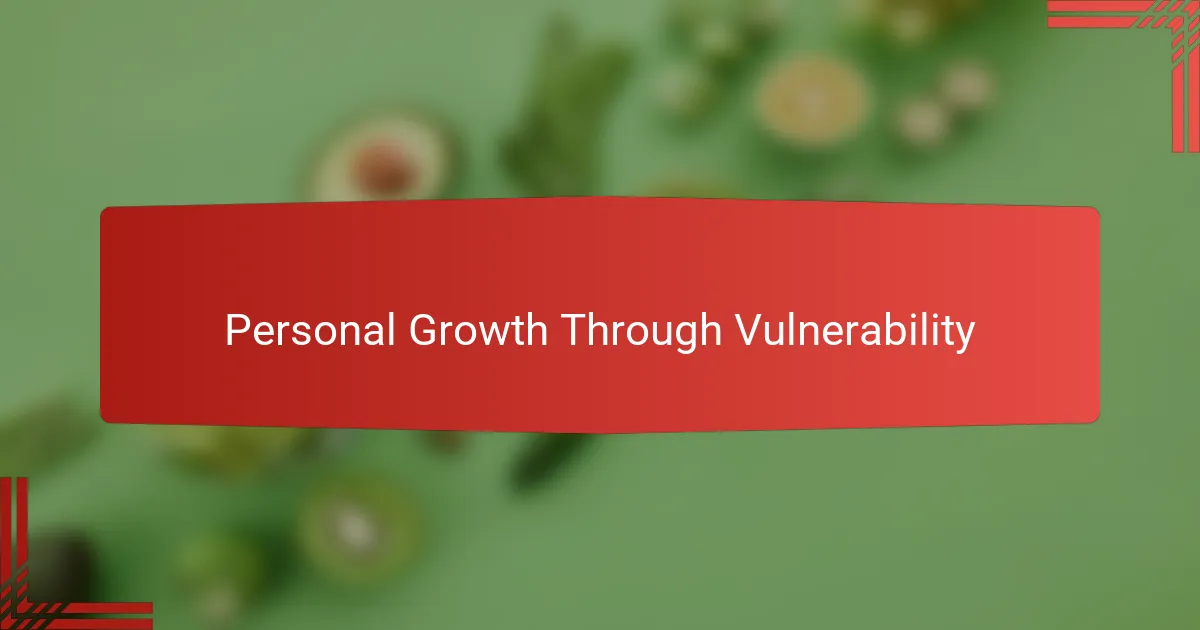
Personal Growth Through Vulnerability
When I started embracing vulnerability as a path to personal growth, I realized it wasn’t about losing control but gaining self-awareness. Have you ever noticed how admitting uncertainty opens doors to deeper understanding within yourself? For me, that admission was the first step toward healing old wounds and fostering resilience.
It struck me how vulnerability forces us to confront uncomfortable truths—like acknowledging our imperfections or fears—and in doing so, it creates space for genuine transformation. I recall a moment when sharing my struggles led not to judgment, but to compassion, both from myself and others. Isn’t it freeing when we stop hiding and start growing?
Most importantly, vulnerability has taught me that personal growth is not a solo journey. When I allowed myself to be seen, I attracted support and authentic connection that propelled me forward. Have you experienced how being open invites others to walk alongside you, making growth feel less daunting and more inspiring?
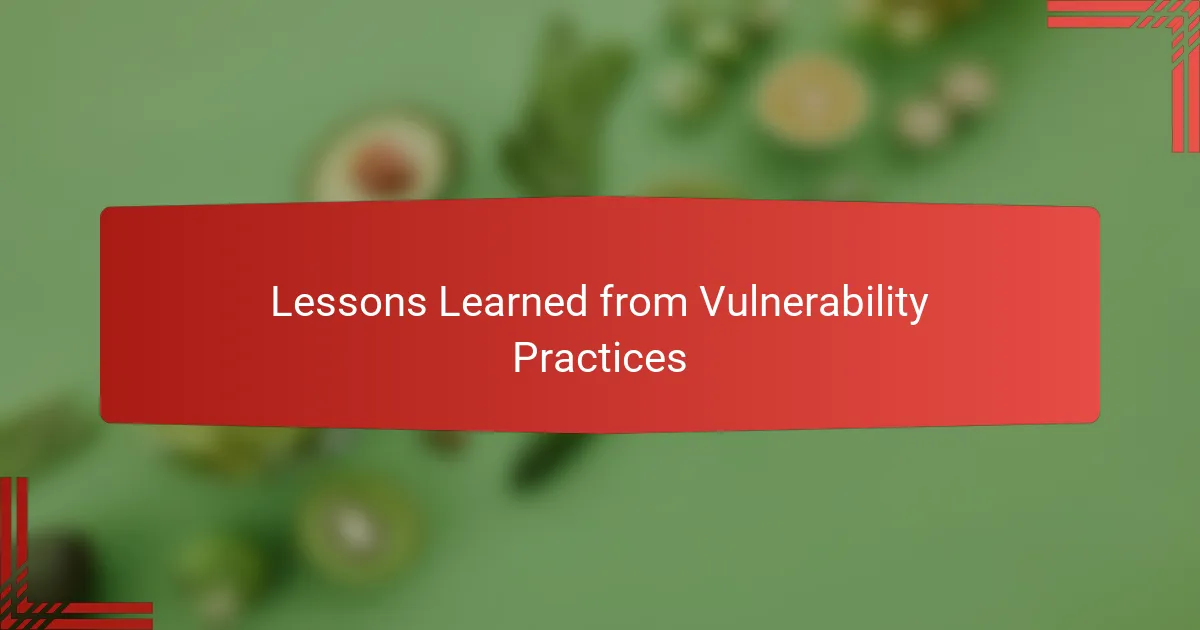
Lessons Learned from Vulnerability Practices
One lesson I learned from practicing vulnerability is that it requires continual courage. Each time I choose to be open about my uncertainties or fears, I step into discomfort, knowing it could lead to misunderstanding or judgment. Yet, I’ve found that this willingness to be exposed often invites others to do the same, creating a ripple effect of authenticity and mutual support.
I also realized that vulnerability isn’t a one-time act but a practice that deepens over time. Early on, I remember feeling exposed and unsure if I was “doing it right,” but perseverance revealed that vulnerability cultivates stronger bonds and clearer communication. How often do we resist vulnerability because we don’t realize it’s a skill we can develop with patience and practice?
Finally, embracing vulnerability taught me to shift my perspective on control. Instead of trying to manage every outcome perfectly, I learned to welcome imperfection as part of the human experience. This shift brought a sense of relief and freedom—when I accept that vulnerability means embracing uncertainty, I find myself more present and connected in both coaching and community life.